
A little over 50 years ago, Lacy Ford sat in his University of South Carolina dormitory reading a history book.
For fun.
Ford was a physics major at the time, but his roommate walked past, saw the book, and asked a life-changing question.
“Why don’t you major in history?” Ford recalls the roommate saying. “Every time you’re sitting around doing nothing, you’re reading about history.” That question hit home, and Ford changed his major. He went on to build a career around researching, teaching and writing about history at USC.
At the same time Ford shifted gears to study history, some of his elder scholars were organizing a committee to promote history, literature and the arts statewide. Now known as the nonprofit South Carolina Humanities, the group celebrated its 50th earlier this year.
The celebration continues Oct. 19 as SC Humanities honors Ford, plus several other members of the USC community, during its annual awards luncheon. The occasion is a good moment to reflect on the long relationship between SC Humanities and the state’s flagship university, says Randy Akers, executive director.
“The relationship between USC and SCH covers fifty years," Akers says. “South Carolina Humanities would not have achieved the success it has without a close working partnership with USC.”
From the beginning
In the early 1970s, a USC administrator named Nicholas Mitchell helped organize a committee to manage funds from the National Endowment for the Humanities for projects in South Carolina. The committee sponsored its first programs in 1973, but the first major project commissioned USC scholars to interview residents across the state for a collection of essays about social change.
The partnership never stopped. Just since 1999, SC Humanities has awarded more than $1 million in grants to USC for projects ranging from literature conferences to museum exhibitions, from political talks to historical research.
For example, the collaboration has helped to preserve vital parts of South Carolina’s legacy in the civil rights movement. SC Humanities supported Justice for All, a 2019 exhibition created by the Center for Civil Rights History and Research. The exhibit showcased documents, photographs and educational materials about numerous points of civil rights history.
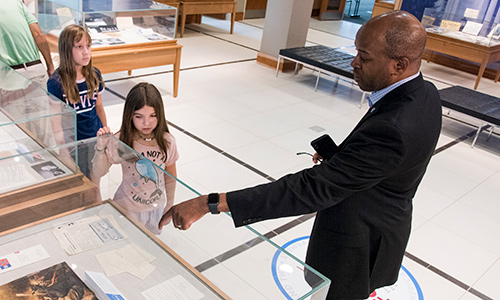
Since then, a traveling version of the Justice for All exhibit supported by SC Humanities and other major donors has visited seven locations across the state. Each stop allows new people to see the exhibit, but it also allows the Civil Rights Center to collect additional materials and historical recollections from people involved with the quest for civil rights in the state.
“We still have many of the people who took part in the Civil Rights movement here with us, but the window is narrowing to record their memories,” says Bobby Donaldson, director of the center. “We want to make sure their experiences are heard and documented.”
SC Humanities also helped the English Department kickstart The Open Book, a popular, long-running literary event that brings big-name and up-and-coming writers to USC. Funding from South Carolina Humanities established the program.
“We’re able to bring in some of the best and most well-known writers working in the English language," says Elise Blackwell, who has run the program since 2012. “We've brought in multiple Pulitzer Prize winners and National Book Award winners.”
The program features public talks by each visiting author as well as a master class with creative writing students in the MFA program, providing emerging writers with new literary perspectives and advice. The events raise the profile of USC’s creative writing program and the city, too.
“The Open Book also allows the authors to take Columbia with them and helps put the University of South Carolina and our city on the literary map,” Blackwell says.

Artists also have brought creative visions to life with support SC Humanities support. A grant helped Laura Kissel, a media arts professor, produce her 2014 film Cotton Road: A Supply Chain Journey. From farms in South Carolina to textile factories in China, the film introduced perspectives of laborers to show the human side of production.
Additional grants have supported other art faculty projects, such as Minuette Floyd’s book about African American camp meetings, as well as programs and public outreach by the McKissick Museum.
“SC Humanities’ investment in our work has contributed greatly to the cultural life of South Carolina’s communities,” Kissel says.
More recently, SC Humanities provided funding for the Anne Frank Center at USC to train high school students to become “Anne Frank Ambassadors” to serve as docents for an exhibition about the Holocaust.
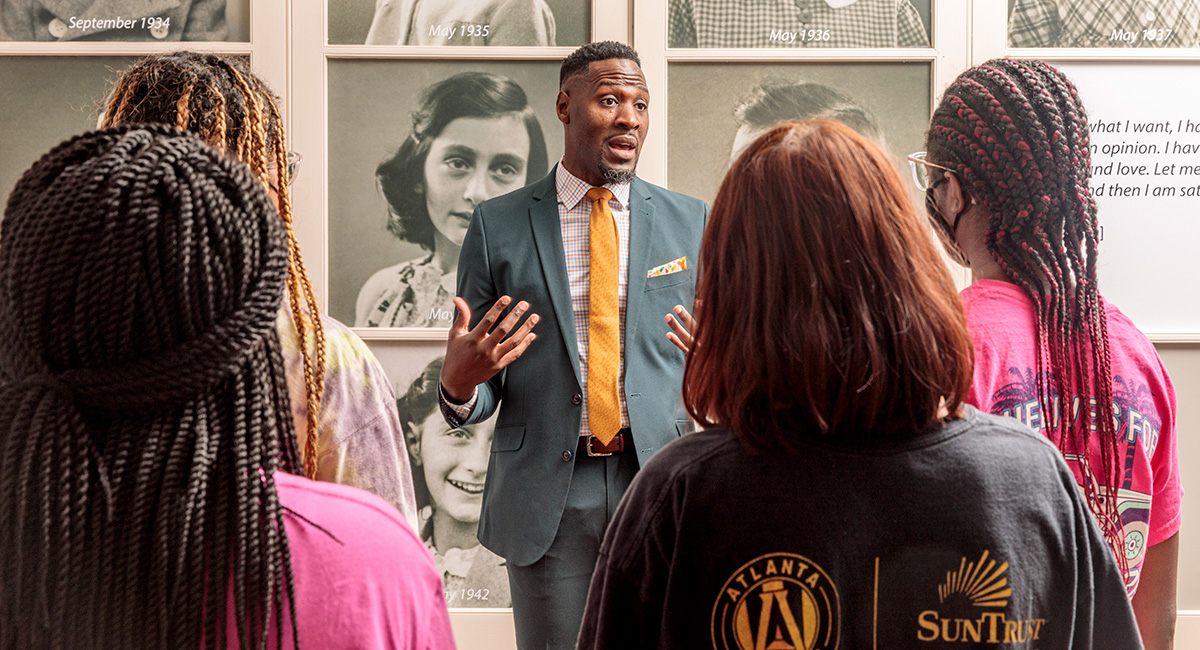
Awards and honors
Several aspects of the humanities come together in the Jasper Project, an initiative that includes a magazine, the Fall Lines literary contest, the 2nd Act Film Festival, “tiny galleries” and numerous arts events. Cindi Boiter, a former women’s and gender studies faculty member, founded the project in 2011.
She says support from SC Humanities, as well as other local sources of funding, has allowed The Jasper Project to pay featured artists and push boundaries with innovative projects.
“For a grassroots organization, every dollar matters,” Boiter says. “To be able to use grant funds to pay the artists, to help validate the work, and then to publish snapshots of the time and talent in SC, it is hugely impactful.”

“The Open Book also allows the authors to take Columbia with them and helps put the University of South Carolina and our city on the literary map.”
Boiter and the Jasper project will receive the Governor’s Award in the Humanities from SC Humanities this month. Ford is receiving the same award.
It’s purely ironic that Ford, whose educational career in history began at the same time as SC Humanities, is receiving the Governor’s Award during the organization’s golden anniversary year. But it’s fitting, since they share a vision for the future.
Having given countless history talks across South Carolina, Ford sees a hunger for knowledge about the past. He often talks to people who say they wish they had taken more history classes. Although he retired in 2022, Ford continues to write and speak as a scholar-in-residence at USC, just as SC Humanities continues to support programs that make such knowledge accessible.
“History, fairly and accurately told, is a valuable guide. It gives us the opportunity to make better decisions,” Ford says. “It’s really important that we champion the humanities publicly."
Award Winners
Several members of the USC community will be honored at the SC Humanities awards ceremony Oct. 19.
The SC Governor’s Awards in the Humanities
 Lacy Ford is a historian and longtime faculty member at USC, as well as a former dean of the
College of Arts and Sciences and a graduate of the Department of History. He is a
two-time recipient of a National Endowment for the Humanities research fellowship.
He has authored multiple books, including the award-winning Deliver Us From Evil: The Slavery Question in the Old South. He also served as senior vice provost and dean of graduate studies. He is now a
scholar in residence at the Institute for Southern Studies.
Lacy Ford is a historian and longtime faculty member at USC, as well as a former dean of the
College of Arts and Sciences and a graduate of the Department of History. He is a
two-time recipient of a National Endowment for the Humanities research fellowship.
He has authored multiple books, including the award-winning Deliver Us From Evil: The Slavery Question in the Old South. He also served as senior vice provost and dean of graduate studies. He is now a
scholar in residence at the Institute for Southern Studies.
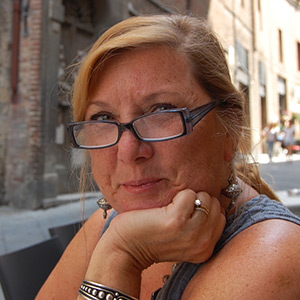 Cindi Boiter was an adjunct instructor of gender studies at USC for years while freelance writing
for national magazines. In 2011, she founded Jasper magazine, a publication devoted strictly to arts in the Midlands that grew into a
touchstone for a number of multidisciplinary arts projects commemorating South Carolina's
cultural history. The Jasper Project operates with no paid employees and little overhead.
Boiter is a six-time recipient of the SC Fiction Project and was awarded the SC Governor's
Award for the Arts in 2014.
Cindi Boiter was an adjunct instructor of gender studies at USC for years while freelance writing
for national magazines. In 2011, she founded Jasper magazine, a publication devoted strictly to arts in the Midlands that grew into a
touchstone for a number of multidisciplinary arts projects commemorating South Carolina's
cultural history. The Jasper Project operates with no paid employees and little overhead.
Boiter is a six-time recipient of the SC Fiction Project and was awarded the SC Governor's
Award for the Arts in 2014.
The Akers Prize (Formerly the Fresh Voices in the Humanities Award)
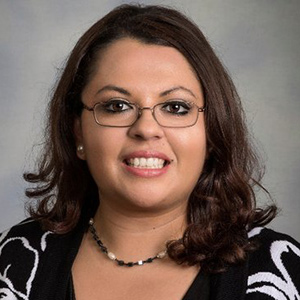 Araceli Hernández-Laroche is a professor of modern languages and French program coordinator at USC Upstate.
Fluent in four languages, she has organized numerous cultural events, globally themed
conferences and multigenerational public humanities programming in multiple languages.
She also is the founding director of South Carolina Centro Latino, the state’s first university-based center for the study of Hispanic and Latino cultures.
Araceli Hernández-Laroche is a professor of modern languages and French program coordinator at USC Upstate.
Fluent in four languages, she has organized numerous cultural events, globally themed
conferences and multigenerational public humanities programming in multiple languages.
She also is the founding director of South Carolina Centro Latino, the state’s first university-based center for the study of Hispanic and Latino cultures.
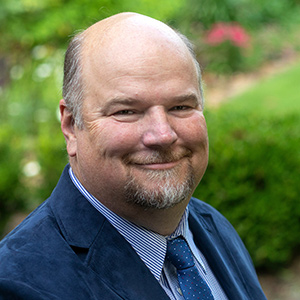 Doyle Stevick is the founder and executive director of the University of South Carolina’s Anne
Frank Center, an official partner of the Anne Frank House and one of three partner
sites globally. Stevick oversees the center’s educational activities and outreach
to groups across South Carolina and the nation, including 15 traveling exhibits reaching
50,000 people in 21 states. He has presented for UNESCO, the International Bureau
of Education, and the OSCE’s Office for Democratic Institutions and Human Rights around
the globe.
Doyle Stevick is the founder and executive director of the University of South Carolina’s Anne
Frank Center, an official partner of the Anne Frank House and one of three partner
sites globally. Stevick oversees the center’s educational activities and outreach
to groups across South Carolina and the nation, including 15 traveling exhibits reaching
50,000 people in 21 states. He has presented for UNESCO, the International Bureau
of Education, and the OSCE’s Office for Democratic Institutions and Human Rights around
the globe.
Staff writers Rose Cisneros and Laura Erskine contributed to this story.